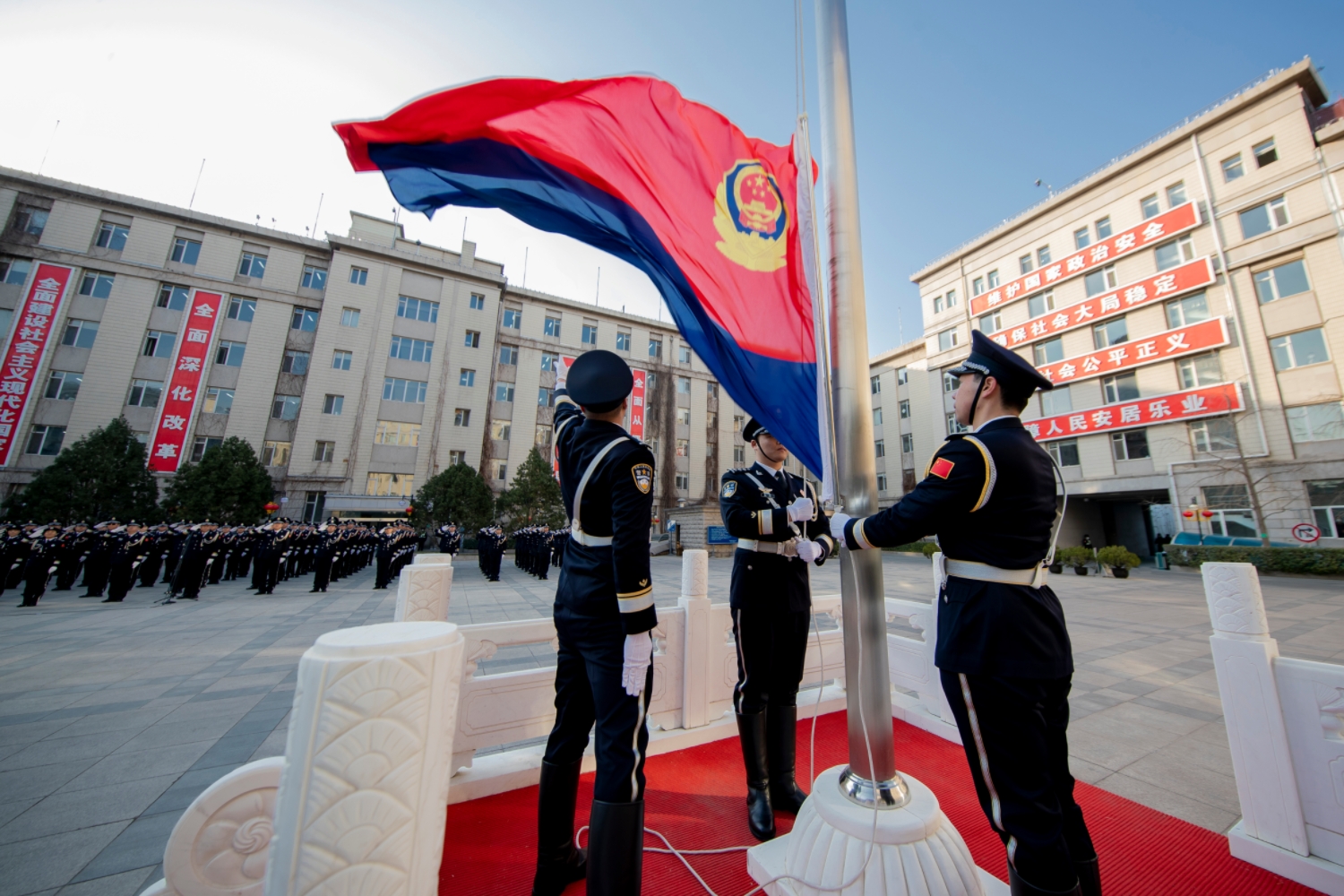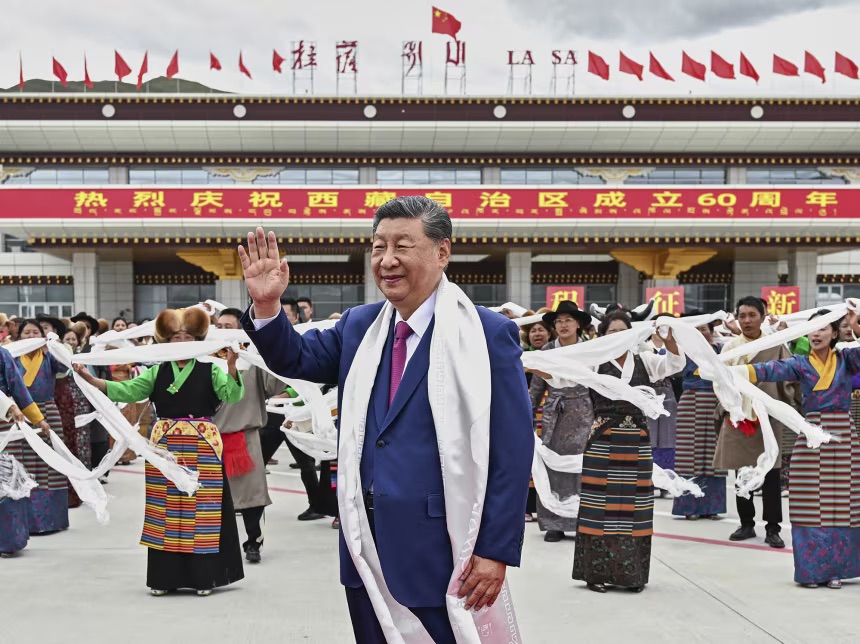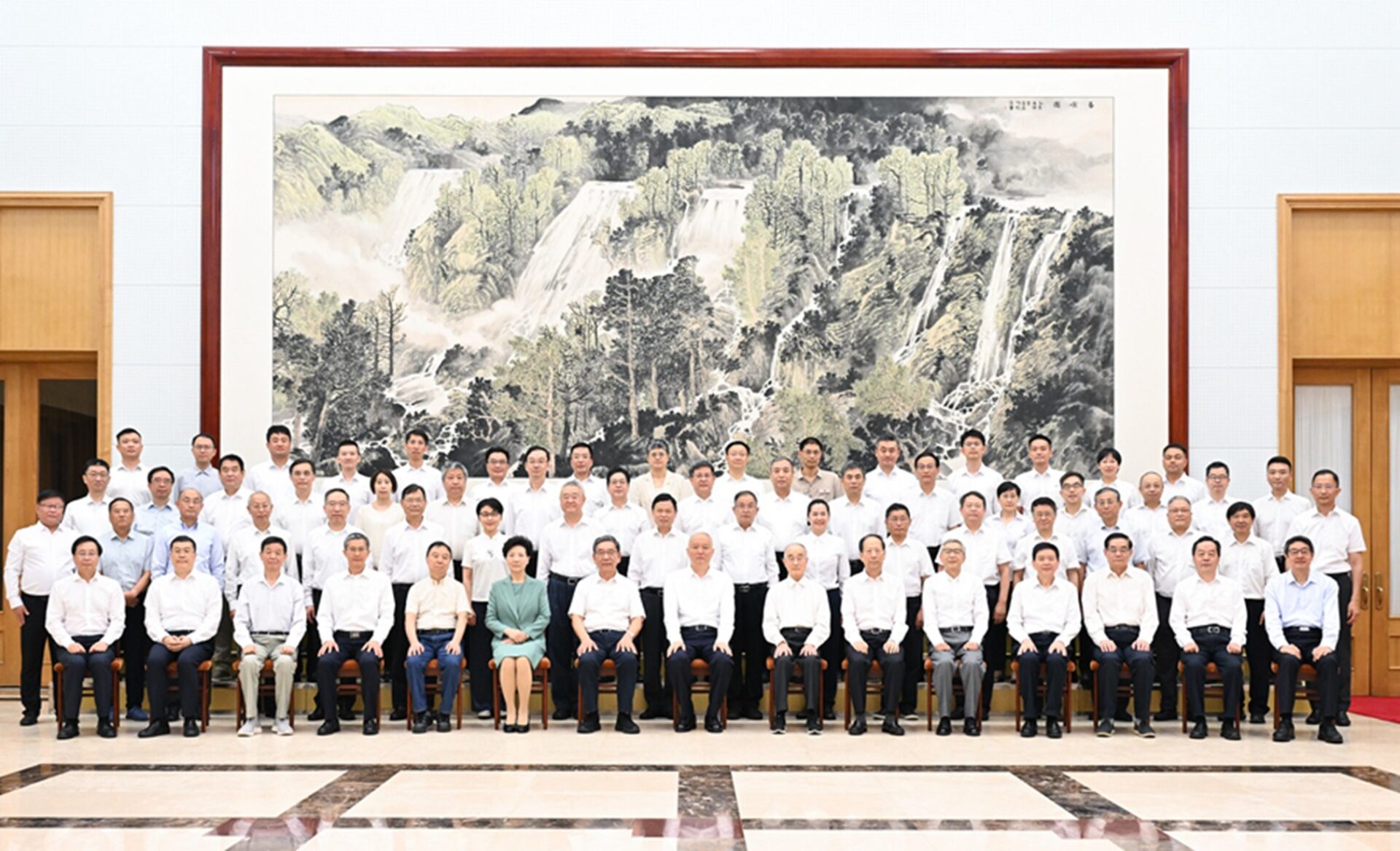
Winter is Coming: Beijing Tightens Public Security
Winter is Coming: Beijing Tightens Public Security
Executive Summary:
- A new campaign, “Operation Winter,” has been announced to mobilize public security officials in the wake of deadly attacks across the People’s Republic of China.
- The operation seeks to mobilize extra human resources and integrated technology to enhance the party-state’s apparatus of “preventive repression,” resolving issues at the earliest opportunity.
- At the grassroots level, the policies create an invasive and repressive environment that is unlikely to resolve social malaise and discontent.
- The operation’s evolution is a classic example of a successful local experiment (in this instance from Guizhou) being rolled out nationwide. Its rollout also exemplifies how central directives are implemented across the system.
On November 12, Xinhua reported that Chinese Communist Party (CCP) General Secretary Xi Jinping had issued important instructions in response to a shocking incident in Zhuhai, Guangdong Province, in which a car plowed into and killed at least 35 people. Xi’s instructions related to the victims of the attack, the perpetrator, and public security officials themselves. For the latter, he demanded that all districts and relevant departments should “deeply draw lessons, make inferences, and strengthen the prevention and control of risks at their source (深刻汲取教训、举一反三,加强风险源头防控).” He also instructed officials to “resolve contradictions and disputes in a timely manner and prevent the occurrence of extreme cases (及时化解矛盾纠纷,严防发生极端案件,全力保障人民群众生命安全和社会稳定)” (Xinhua, November 12).
In the ensuing three weeks, the Party-state’s public security apparatus has sprung into action. At the national level, Xi’s high-level directive has been cited by secretary of the Central Political and Legal Affairs Commission (CPLC; 中央政法委) Chen Wenqing (陈文清) at special meeting, by the CPLC’s secretary-general Yin Bai (訚柏) at an event in Hangzhou, Zhejiang Province, by the Ministry of Justice (MOJ; 司法部) in a special meeting to announce new measures, and by the Supreme People’s Procuratorate (SPP; 最高检) at the National Conference on Criminal Prosecution Work of Procuratorial Organs in Fuzhou (SPP, November 19; Xinhua, November 22; 163, November 24; Xinhua, November 24). [1] Public security bureaus at the provincial level and below have followed suit.
Minister of Public Security Wang Xiaohong (王小洪) used his address to national public security organs to announce the beginning of “Operation Winter (冬季行动).” Sources indicate that the phrase is being used as an umbrella term to mobilize public security work in what is a difficult time of year—the winter months often see unrest from those seeking unpaid wages (“讨薪”), and Spring Festival tends to see a spike in crime and huge internal migration. The phrase’s use alongside other key terms in the current public security lexicon suggest that it is being deployed to complement or reinforce initiatives signaled at major events earlier this year, such as the Central Political and Legal Work Conference in January and the National Public Security Work Conference in May (SPP, January 14; CCP Member News, May 30).
Operation Winter: A Case Study in Local Experimentation
As of December 2, meetings about “Operation Winter” had been held by at least 19 provincial-level public security bodies, and likely in others too. [2] An article in China Police Daily—the official paper of the Ministry of Public Security—makes it clear that it is intended as an overarching framework for the next few months’ work. It states that Beijing’s Municipal Public Security Bureau has taken “Operation Winter” as “one of the central tasks of the entire bureau (全局中心之一),” and avows that it will “resolutely prevent the occurrence of major security accidents in the public security domain (坚决防止发生公安管辖领域重大安全事故)” (China Police Daily, December 5).
The phrase seems to have appeared first in Guizhou in late 2023. The provincial public security bureau announced last November that from December 1, 2023, to February 29, 2024, it would carry out “Operation Winter Peace (冬季平安行动)” (China Police Daily, November 28, 2023). The tagline appears to have been picked up in limited fashion elsewhere—including earlier this year with references to an “Operation Summer (夏季行动)” (China Police Daily, December 4). As is commonplace in the PRC, local policy innovations that achieve a degree of success are often scaled up and rolled out nationwide.
“Operation Winter” has now taken off across the People’s Republic of China (PRC). Following the national-level announcements, multiple local bodies have been burnishing their successes in carrying out work under the new rubric. In the last week of November, China Police Daily announced a new column titled “Deeply Implementing ‘Operation Winter’ (深入开展‘冬季行动’),” with the aim of “reporting on the public security organs to strongly promote the measures taken and the effectiveness of the operation (及时报道公安机关扎实推进行动的举措和成效).” “Please pay attention (敬请关注!),” the authors write (China Police Daily, November 24). Local bureaus have jumped on the trend, posting their own serialized content to update readers on their efforts (The Paper, November 25).
Some of the work framed as part of “Operation Winter” appears to be a direct result of the recent attacks. For example, in Qin’an (秦安) in Gansu Province, public security officials have worked with the local education bureau to install 35 “anti-ramming measures (防冲撞设施)” outside all schools and university campuses in the county, along with other public places (China Police Daily, December 4). Other localities are deploying drones to help surveil traffic and key areas (The Paper, November 25). Patrols also appear to have increased in frequency across the country (Xinhua, November 20; The Paper/Baiyin Public Security Bureau, November 25; China Police Daily, December 4). However, a lot of the reported work passed off as part of “Operation Winter” appears simply to be standard policing—fighting petty crimes and uncovering local cases of fraud, theft, and low-level traffic violations. This is unsurprising: Local public security departments likely do not have the resources to increase capacity, especially given the current, dismal state of local government finances.
Grassroots Repression via new ‘Comprehensive Governance Centers’
Beijing’s “Operation Winter” has promoted several other public security initiatives that the Party has been prioritizing in recent times. These include the “Fengqiao experience (枫桥经验),” the “new police operation model of ‘specialization + mechanization + big data’ (‘专业+机制+大数’新型警务运行模式),” the “‘millions of police into ten million homes’ activities (‘百万警进千万家’活动),” the “new quality combat forces (新质战斗力),” “weaving a dense social and public opinion information ‘network’ (织密了社情民意信息‘网’),” and “resolving situations by nipping them in the bud (化解在萌芽状态).” [3]
One innovation that is frequently mentioned is the creation of “comprehensive governance centers (综治中心).” Chen Wenqing’s speech addressed these, noting that “efforts have been made to promote the standardization of comprehensive governance centers (着力推进综治中心规范化建设)”—something that was echoed by Yin Bai (Xinhua, November 22; 163, November 24). Wang Xiaohong describes these centers as “‘one-stop’ synthesis centers for battlefield positions (综治中心‘一站式’阵地)” (Xinhua, November 20). [4] They appear to be upgraded versions of community service centers (社区服务中心) or neighborhood offices (街道办) that primarily focus on resolving disputes among local residents. Unlike these earlier institutions, the new centers are proactive rather than reactive and are tasked with monitoring and issuing early warnings about potential social conflicts. They aggregate and synthesize relevant information from a range of sources (likely including informants, law enforcement and ‘grid management’ officials, security camera footage, and other surveillance systems). While still in an early stage of development, the centers seem to have received an official imprimatur and are being given the responsibility for managing grassroots security work. As the CPLC has articulated, these centers’ preventive measures should “improve precise predictions, accurate early warnings, and refined prevention abilities, and allow for science and technology to better empower grassroots political and legal work (提高精确预测、精准预警、精密预防能力,让科技更好赋能基层政法工作)” (163, November 24).
Functionally, the proactive approach that these centers promote frequently involves a fairly invasive violation of people’s privacy and a high degree of surveillance. For instance, among other things, the Ministry of Justice has directed grassroots officials to “conduct in-depth investigations into common and frequent conflicts and disputes over marriage and family (深入排查常见多发的婚姻家庭 … 等矛盾纠纷)” (Xinhua, November 24). One example of this work given by the Yinchuan Municipal Public Security Bureau involves a grid management member being tipped off about a dispute between neighbors. In the account, the grid management member went to resolve the dispute, and upon arrival at the scene “immediately stabilized both sides’ emotions (第一时间稳控住双方情绪),” before following a dispute resolution playbook (The Paper, December 3).
The High Cost of Preventive Repression
The CCP’s various public security initiatives share the objective of enhancing the party-state’s coercive security apparatus—what the scholar Minxin Pei describes as a system designed to achieve “preventive repression” via “distributed surveillance.” [5] The idea of preventive repression—stopping crimes from occurring before they take place—aligns with Xi’s call in early November to control the sources of risk and resolve disputes. The phrase “resolve conflicts and disputes” is ubiquitous in writings about “Operation Winter.”
Campaigns such as the current “Operation Winter” reflect the PRC regime’s reliance on constant mobilizational efforts to achieve its goals (CSIS, May 8, 2020). Given the unusually high number of “extreme cases” in recent weeks, there are grounds for arguing that the PRC’s vast surveillance state has several blind spots that need to be rectified. The head of the SPP appears to believe that this is the case, and has urged officials to be more courageous in “self-supervision (自我监督)”—a term that is connected to the idea of “self-revolution (自我革命),” which refers to a spiritually puritanical self-discipline that all officials must maintain (China Brief, January 10; Qiushi, March 29; The Paper, November 20).
The need to go to such efforts to mobilize officials could also indicate that the leadership in Beijing harbors fears about the efficacy of the system it is constructing. For instance, there are concerns that poor conduct from public security officials could itself lead to social backlash: The SPP also has recently argued that “the handling of cases in strict accordance with the law is in itself a means of preventing and resolving risks (严格依法办案本身就是防范化解矛盾风险)” (SPP, November 19). More troubling is the fact that the recent spate of attacks has occurred despite many of Beijing’s initiatives to enhance preventive repression that have been in place well before the announcement of “Operation Winter.”
Conclusion
“Operation Winter” started earlier this year than it did in its nascent form in 2023, suggesting that Beijing perceived a need to ramp up public security measures ahead of time in the wake of November’s devastating attacks. One potential measure of its success or failure may be the occurrence of any further “extreme cases” in the near future. Another will come from parsing the output from the Central Political and Legal Work Conference, likely to be held in January.
The current campaign shows that the CCP’s heavily labor-intensive and increasingly technologically equipped system of preventive repression continues to be tightened. While it has apparently been successful to date in reducing political risks to the Party—and perhaps risks to the public more broadly—it is likely to have unintended consequences. Ultimately, the Party claims that its aim with these measures is to “protect the people’s happiness and peace of mind (守护人民幸福和安宁)” (Xinhua, November 21). However, the recent attacks are one tragic indicator that happiness and peace of mind are in short supply in the PRC today.
Notes
[1] The Party’s political legal committees are responsible for coordination of the party-state’s coercive apparatus, the procuratorial organs are responsible for criminal investigations and prosecutions, the Ministry of Justice oversees the justice system, and the public security system is responsible for law enforcement and maintaining the political security of the CCP.
[2] These include: Chongqing, Guangxi, Yunnan, Fujian, Xinjiang, Shanxi, Hubei, Heilongjiang, Jilin, Qinghai, Tianjin, Hainan, Harbin, Beijing, Zhejiang, Shandong, Sha’anxi, Jiangxi, and Gansu (Sohu, November 30; China Police Daily, November 29; China Police Daily, November 29; China Police Daily, November 30; China Police Daily, December 2; China Police Daily, December 5; China Police Daily, December; China Police Daily, December.
[3] This article lacks the space to address each of these in detail. For a good primer on the “Fengqiao experience,” see: China Media Project, April 16, 2021. China Brief has provided one of the only English-language appraisals of “new quality combat forces”: China Brief, March 15.
[4] According to Minixin Pei, “battlefield positions” refer to social settings (whether in real or cyber space) in which resistance is likely to emerge. See “Chapter 6: Controlling ‘Battlefield’ Positions,” in Pei Minxin, The Sentinel State (Cambridge, MA: Harvard University Press, 2024).
[5] Pei Minxin, The Sentinel State (Cambridge, MA: Harvard University Press, 2024).


